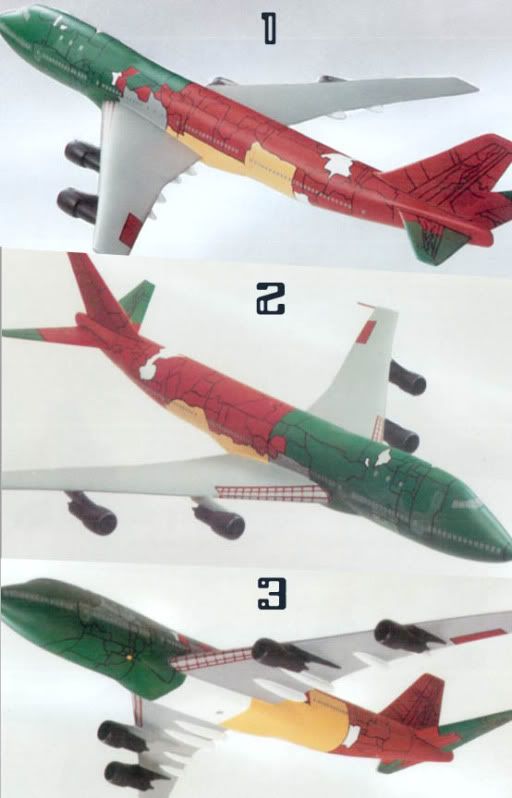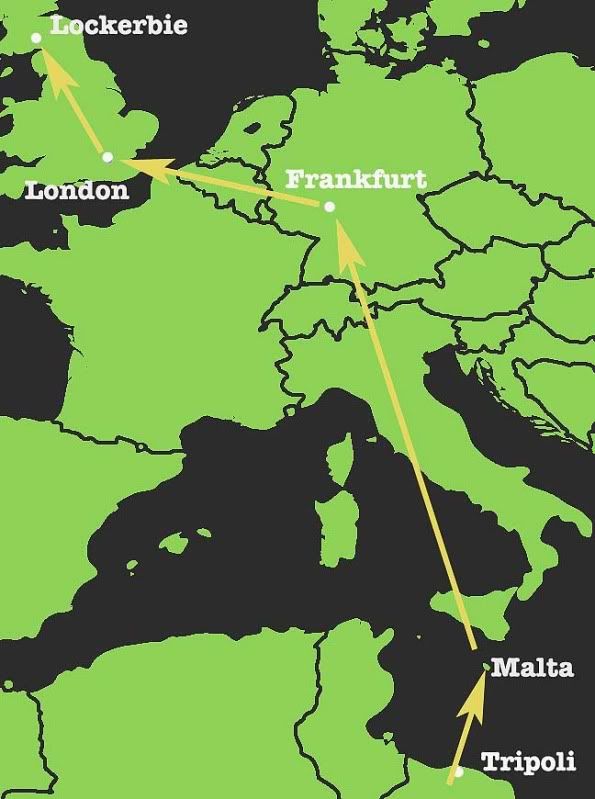20 August 2010 (incomplete)
last edits 27 August
A tale of three atrocities is the name of an unusual little book written by an interesting acquaintance, Mr. Charles Norrie, as of recently available in an on-line form. Mr. Norie is an English family member of an alleged Libyan atrocity, having lost his brother to the 1989 bombing of UTA 772 over Niger.
While he does accept Libyan guilt in that attack, Norrie has taken a major interest in the lack of a case for Libyan guilt in a second atrocity, the Lockerbie bombing. His unusual position has brought him to sign, along with myself and others, the most recent petition of the Justice For Megrahi campaign.
First, I’m one of the few people Charles has blessed with a hard copy of the mythic "green ATOTA," and I think I’ve read all of it by now, but never all at once. It's a neat little book, slick design, size and shape like a small company's annual report. The layout is tasteful, with full color photographs and glossy finish. (see image at left, atop my small Lockerbie library).
That's what you can't see in the Blogspot posting, but the text is the same (I presume) and can finally be seen by a wider audience. The writing is decent, with spots of genius and others of just cleverness. The actual ideas, the methodology and presumptions behind them, are more problematic for me. I’ll attempt to summarize a bit clumsily from my half-understanding.
Much of what’s in ATOTA is well-reasoned - especially when it comes to spotting problems with the official story against Megrahi, or with linking the 103 bombing to the third "atrocity" of the title. Along with myself and many others, Norrie believes the cause of Lockerbie to have been the 1988 downing of Iran Air Flight 655. While he suspects the associated PFLP-GC clues were just as fake as the Libyan ones (they were the original "scapegoat"), his concept of the “Qesas” revenge code is compelling. This would mean an Iranian hand was required to “pull the trigger,” perhaps a family member of an IA 655 victim.
London is the place this was done, apparently for operational security reasons. Would terrorists be so daft as to introduce their bomb two airports away and trust fate to pass it through each screening? I happen to agree on London introduction, in part for the same reason, and Iran Air’s terminal was in Terminal three at Heathrow, not far from where the bomb was finally loaded, via container AVE 4041.
The technical details ATOTA proposes are what get confusing. It seems he’s saying the bomb was not inside of luggage at all, but rather attached/built into the luggage container to resemble a repair patch. To not stand out, he agrees it would have to be, at most, one inch thick, this explosive device with an ice cube timer, and faced in rough aluminum. He reasons "if the bomb was in a suitcase it would have been spotted on the morning of 21st December by Heathrow baggage handlers." Well, it was, apparently as part of a matching set.
It almost seems Norrie is adding a shape-charge aspect to the 1/2” thick bomb notion. As he explains:
The official explanation for Lockerbie is that a bomb was concealed in a suitcase. Yet a bomb in a suitcase would explode in all directions. In contrast, the hole in the side of the plane seemed to indicate a unidirectional explosion. This makes sense if a bomb was attached to the side of a luggage container, slightly above the bottom.Actually, the blast that’s alleged would be fairly uni-directional, relative to the nearest hull metal - inside pointing out. In fact, being inside the container and a bit lower than shown (at left, from AAIB report) could explain the low cut-off of damage (red hatching). It could be cut off by the layer of bags above.
This supporting passage has me scratching my head still:
Peter Claydon told the court the bomb created an 8-inch square hole in AVE4041 PA and a 20-inch square hole in the skin of the aircraft.I’ve read Mr. Claiden’s testimony and found no such statement. This would have to be a very unidirectional explosive device to leave a square hole after detonating, and the same size as the 8” square repair patch he shows in a photo on page 13. In fact, the damage to the outboard panels was measured in feet.
The closest thing I can see to an 8-inch hole is the opposite - a chunk of metal about that size that Claiden felt was from the middle of a huge span of completely missing metal (labeled "e" at right, from AAIB report). This was at almost exactly the bomb position, and his hunch that this intact metal is from there remains bizarre and inexplicable.
Norrie’s theory also goes deeper than Iranian involvement, suggesting the Americans were involved in the plot as well - to ensure its success. The primary evidence he cites for this is the second explosion, at the other end of the plane and triggered 14 seconds later, it had to be an independent device that proves "Megrahi cannot be guilty."
I now believe the cause of the additional blast was a CIA 'insurance bomb'. Its purpose was to guarantee no one survived the bombing, ensuring the Iranians would be completely satisfied with the operation, and the Qesas condition fulfilled.I think this was to deflect wider promised attacks.
 To support the second bomb theory, he cites an unsupported statement from apparently loon John Parkes that "a minimum of two high explosive events took place inboard Pan Am 103." And he points to the twin debris fields, north and south, as pre and post-second bomb. I'm not certain of the right answer to there being two fields, but I should think it could have many explanations in a complex breakup like that of Flight 103, even without a second detonation.
To support the second bomb theory, he cites an unsupported statement from apparently loon John Parkes that "a minimum of two high explosive events took place inboard Pan Am 103." And he points to the twin debris fields, north and south, as pre and post-second bomb. I'm not certain of the right answer to there being two fields, but I should think it could have many explanations in a complex breakup like that of Flight 103, even without a second detonation. For the location of the second bomb, Norrie cites a missing section near the rear cargo area which must have been all vaporized by a "brisant explosion." See the image at left (new window for larger view), of the AAIB's painted model. Those sections coded in white were never recovered. Charles would be referring to the section on the lower rear of the craft (seen in view 3). But many other sections at random spots were missing as well, in at least seven apparent "brisant explosions" all over the plane. For whole panels of aluminum to disappear in Scotland might seem odd, but there are a lot of lochs that maybe weren't fully dredged, etc...
---
more perhaps forthcoming ...
I give Charles Norrie the comments section below to help us grasp what he’s got here.
Note 3 Sept. - he opted not to use that much, but took it to the JREF and, at Rolfe's invitation, proceded to ... well to fail, for one.
Note 19 September: I've decided to breach e-mail confidentiality to confirm that Charles' ridiculous behavior at the JREF was part of a strategy to accrue yet more"suppression"of the the ype he's encountered at Wikipedia and now at Prof.Black's blog (first ever banning there I know of).





